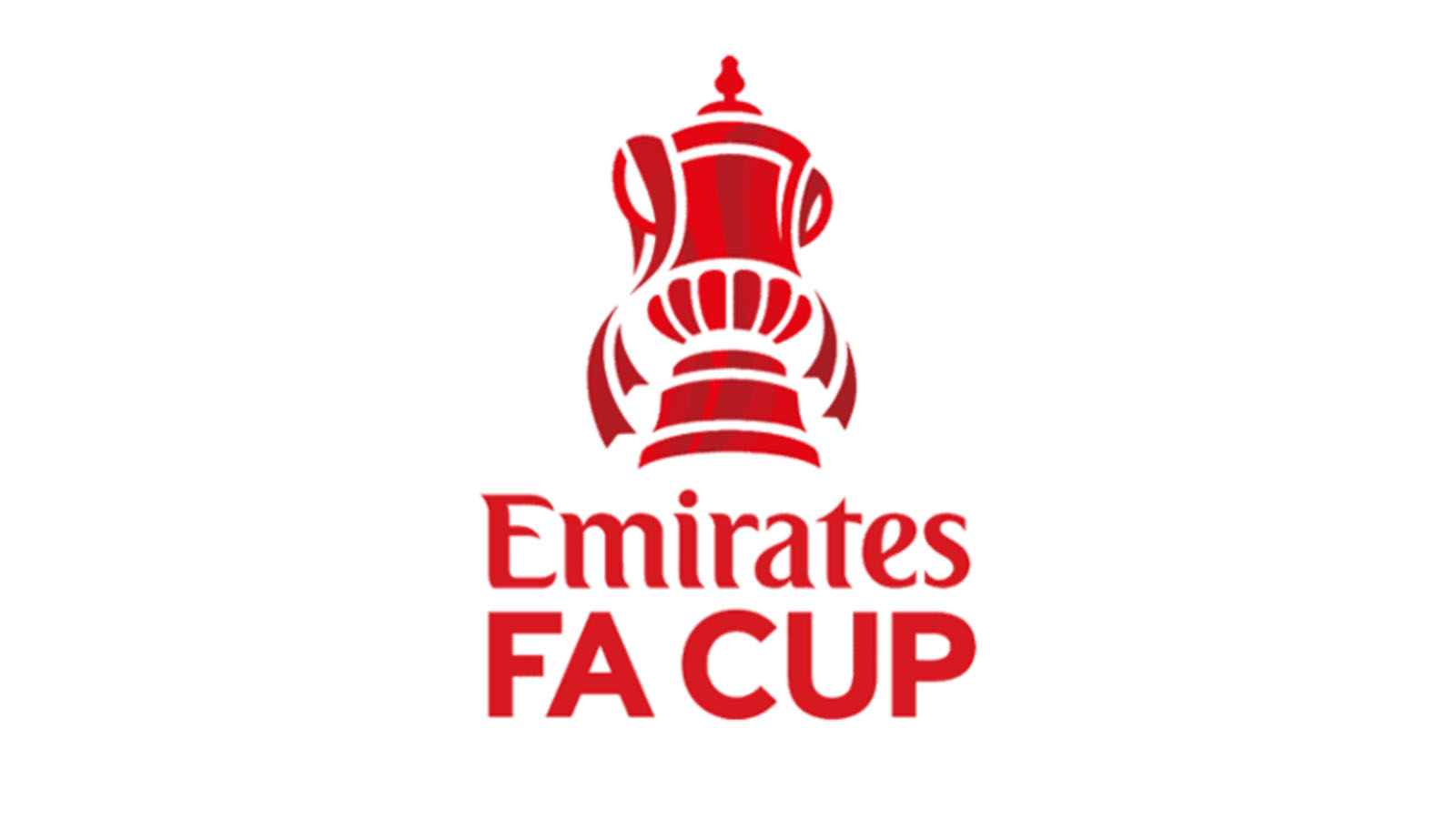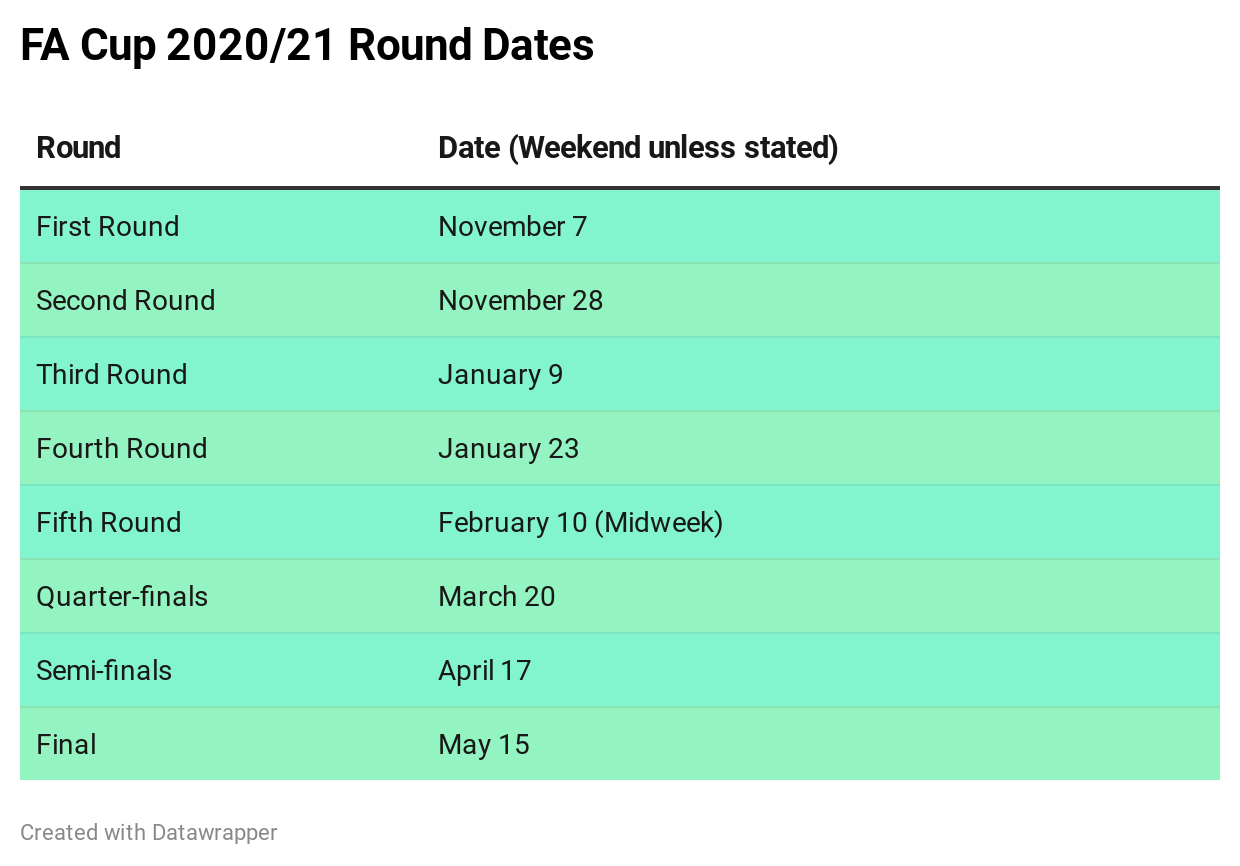FA Cup Match Dates: Your Ultimate Guide To The Thrilling Football Tournament
The FA Cup, officially known as The Football Association Challenge Cup, is one of the most prestigious and historic football competitions in the world. Dating back to 1871, it has become a staple of English football culture, captivating fans with its unique format and unexpected twists. If you're a football enthusiast, understanding the FA Cup match dates is essential for staying updated on this thrilling tournament.
From its humble beginnings to the grand spectacle it is today, the FA Cup continues to attract millions of viewers worldwide. The competition features teams from various levels of English football, creating a platform where underdogs can challenge the elite clubs. This unpredictability adds to the excitement, making each match date significant for both players and fans.
In this comprehensive guide, we will delve into the FA Cup match dates, exploring the tournament's structure, key fixtures, and everything in between. Whether you're a seasoned fan or a newcomer to the world of football, this article will provide you with all the information you need to fully enjoy the FA Cup experience.
Read also:The Swan Club Ny A Hidden Gem In The Heart Of New York
Table of Contents
- The History of the FA Cup
- Understanding the FA Cup Structure
- Key FA Cup Match Dates
- Preliminary Round Details
- First Round Overview
- Third Round: The Start of the Main Draw
- Quarter-Finals: The Elite Eight
- Semi-Finals: The Road to Glory
- The FA Cup Final: The Grand Finale
- Tips for Following FA Cup Matches
The History of the FA Cup
The FA Cup holds a special place in the hearts of football fans, as it is the oldest national football competition in the world. Established in 1871, the tournament has undergone numerous changes over the years, but its core essence remains the same – a celebration of football's unpredictability and passion.
Initially, the competition featured just 15 teams, all of which were amateur clubs. However, as the sport grew in popularity, the FA Cup expanded to include professional teams and clubs from lower divisions. This inclusivity has made the FA Cup a true test of skill and determination, where smaller clubs have the chance to shine against the giants of the game.
Evolution of the FA Cup
- 1871: The first-ever FA Cup takes place.
- 1923: The competition moves to Wembley Stadium, marking the beginning of the "Wembley Final" tradition.
- 1999: The introduction of the Premier League sees a shift in the tournament's format, with more emphasis on top-tier clubs.
Understanding the FA Cup Structure
The FA Cup is renowned for its unique structure, which sets it apart from other football tournaments. Unlike league competitions, the FA Cup follows a knockout format, where teams play single-elimination matches until a winner is crowned.
The competition begins with preliminary rounds, involving lower-tier clubs, before progressing to the main draw, where top-tier teams enter the fray. This structure ensures that the FA Cup remains competitive and exciting throughout its duration.
Key Stages of the FA Cup
- Preliminary Rounds: Featuring non-league teams.
- First Round: The start of the main competition.
- Third Round: Where Premier League and Championship teams enter.
- Final: The ultimate showdown at Wembley Stadium.
Key FA Cup Match Dates
Staying updated with the FA Cup match dates is crucial for fans who want to follow the tournament closely. Below is a breakdown of the key dates you should mark on your calendar:
- Preliminary Rounds: Late August to early September
- First Round: Mid-November
- Third Round: Early January
- Quarter-Finals: Late March
- Semi-Finals: Mid-April
- Final: Late May
These dates are subject to change, so it's always a good idea to check the official FA Cup website for the most up-to-date information.
Read also:Arnold Schwarzenegger In Modern Times A Look At His Current Life Projects And Legacy
Preliminary Round Details
The preliminary rounds of the FA Cup serve as the starting point for many aspiring teams. These matches typically involve clubs from the lower divisions of English football, providing them with an opportunity to showcase their talents.
While the preliminary rounds may not receive as much media attention as the later stages, they are an integral part of the tournament. Many fans enjoy watching these matches to see potential upsets and discover emerging talents.
Significance of the Preliminary Rounds
- Offers smaller clubs a chance to compete against larger teams.
- Serves as a platform for young players to gain experience.
- Creates excitement and anticipation for the main draw.
First Round Overview
The first round of the FA Cup marks the beginning of the main competition. At this stage, teams from the English Football League (EFL) join the fray, adding more depth and intensity to the tournament.
One of the highlights of the first round is the possibility of lower-tier teams facing off against higher-tier clubs. These matches often result in thrilling encounters, with underdogs occasionally pulling off stunning victories.
Notable First Round Matches
- Non-league teams vs. EFL clubs
- Regional rivalries
- Unpredictable outcomes
Third Round: The Start of the Main Draw
The third round of the FA Cup is where the tournament truly begins to heat up. This is the stage where Premier League and Championship teams enter the competition, significantly raising the stakes.
With high-profile clubs participating, the third round often features marquee matchups that attract widespread attention. These matches are not only crucial for the teams involved but also for fans who eagerly anticipate the drama and excitement they bring.
Why the Third Round Matters
- Entry of top-tier clubs
- Increased media coverage
- Potential for memorable upsets
Quarter-Finals: The Elite Eight
Reaching the quarter-finals of the FA Cup is a significant achievement, as it signifies that a team has successfully navigated through several challenging rounds. At this stage, only the strongest teams remain, making each match a high-stakes affair.
The quarter-finals are often filled with intense rivalries and nail-biting finishes, as teams fight for a spot in the semi-finals. These matches are a testament to the skill, determination, and resilience of the participating teams.
Key Features of the Quarter-Finals
- Elite-level competition
- Highly competitive matches
- Media and fan anticipation
Semi-Finals: The Road to Glory
The semi-finals of the FA Cup represent the penultimate stage of the tournament, where only four teams remain in contention for the coveted trophy. Traditionally held at Wembley Stadium, these matches are a spectacle of football excellence.
Each semi-final is a battle of wills, as teams strive to secure their place in the final. The atmosphere during these matches is electric, with fans from all over the country gathering to witness the action.
What to Expect in the Semi-Finals
- Top-tier teams competing for glory
- Wembley Stadium hosting the matches
- Massive media coverage
The FA Cup Final: The Grand Finale
The FA Cup final is the crowning moment of the tournament, where two teams face off in a winner-takes-all match. Held at Wembley Stadium, the final is a celebration of football, drawing millions of viewers from around the world.
For the teams involved, the final represents the culmination of months of hard work and dedication. Winning the FA Cup is a prestigious achievement, adding to a club's legacy and providing players with a moment of glory they will cherish forever.
Traditions of the FA Cup Final
- Wembley Stadium as the venue
- Pre-match ceremonies and fanfare
- Post-match celebrations
Tips for Following FA Cup Matches
Whether you're a seasoned football fan or a newcomer to the sport, here are some tips to enhance your FA Cup experience:
- Stay updated with the latest match dates and fixtures.
- Follow your favorite teams closely throughout the tournament.
- Engage with fellow fans on social media to share your thoughts and predictions.
- Watch matches live whenever possible to fully immerse yourself in the excitement.
By following these tips, you'll be able to enjoy the FA Cup to its fullest and appreciate the rich history and tradition behind this iconic tournament.
Kesimpulan
The FA Cup match dates play a crucial role in the tournament's structure and excitement. From the preliminary rounds to the grand finale, each stage offers unique opportunities for teams to showcase their skills and for fans to witness unforgettable moments.
We encourage you to stay engaged with the FA Cup by following the match dates, fixtures, and results. Share your thoughts and experiences in the comments below, and don't forget to explore other articles on our site for more insightful content. Together, let's celebrate the beauty of football and the timeless tradition of the FA Cup!


